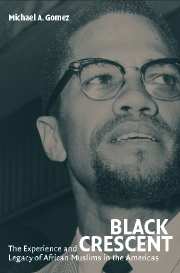Book contents
- Frontmatter
- Contents
- Acknowledgments
- Prologue
- PART ONE
- 1 Ladinos, Gelofes, and Mandingas
- 2 Caribbean Crescent
- 3 Brazilian Sambas
- 4 Muslims in New York
- 5 Founding Mothers and Fathers of a Different Sort: African Muslims in the Early North American South
- Interlude: Into a Glass Darkly – Elisive Communities
- PART TWO
- Epilogue
- Index
5 - Founding Mothers and Fathers of a Different Sort: African Muslims in the Early North American South
Published online by Cambridge University Press: 05 June 2012
- Frontmatter
- Contents
- Acknowledgments
- Prologue
- PART ONE
- 1 Ladinos, Gelofes, and Mandingas
- 2 Caribbean Crescent
- 3 Brazilian Sambas
- 4 Muslims in New York
- 5 Founding Mothers and Fathers of a Different Sort: African Muslims in the Early North American South
- Interlude: Into a Glass Darkly – Elisive Communities
- PART TWO
- Epilogue
- Index
Summary
From the foregoing discussion it is clear that African Muslim communities in what is now Latin America and the Caribbean could be numerous and prominent, and at times they directly informed the direction of the regions' historical development. That African Muslims of lesser aggregation and influence could be found in climes as far north as New York City and Canada has also been demonstrated, but the epicenter of the African Muslim community in colonial and antebellum North America (see Map 7) shared something of the character of both North America and the Caribbean in that it was located along the Georgia and South Carolina coasts, comprising both islands and the immediate mainland vicinity. Long viewed as the source and reservoir of Gullah culture, it has become apparent that coastal islands such as Sapelo, St. Simons, St. Helena, and their environs were also the collective site of the largest gathering of African Muslims in early North America, establishing a legacy that continues into the present day. The Georgia–South Carolina Muslim community is therefore the focus of this chapter, and it is discussed in some detail following preliminary observations.
In general, data concerning Muslims in the American South support arguments more tentative than conclusive. Nonetheless, the consistency of the evidence allows for several statements. First, their numbers were significant, probably reaching into the thousands.
- Type
- Chapter
- Information
- Black CrescentThe Experience and Legacy of African Muslims in the Americas, pp. 143 - 184Publisher: Cambridge University PressPrint publication year: 2005



